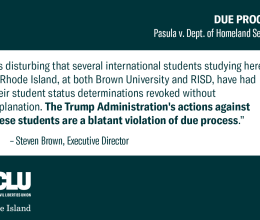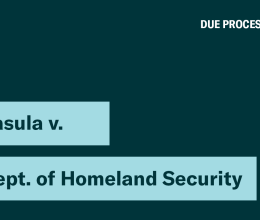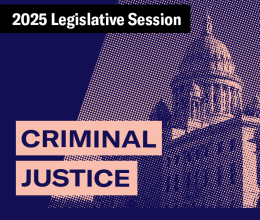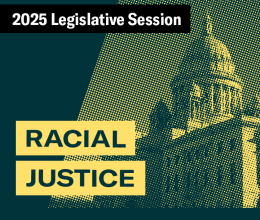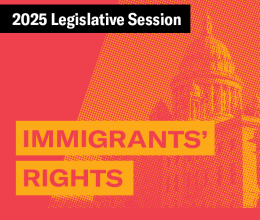In an important decision enforcing a law aimed at reducing harm caused by out-of-school suspensions, an appeals committee of the Council on Elementary and Secondary Education (CESE) has upheld an R.I. Department of Education (RIDE) hearing officer’s decision that the Barrington School District improperly issued an out-of-school suspension to a middle school student. The ACLU of RI represented the student in the appeal after the district contested the RIDE hearing officer’s decision that there was no evidence that the student’s conversation with others – prompted by a recent school shooting – was “disruptive,” a requirement for out-of-school suspension.
In an effort to address the widespread overuse of suspensions by schools, a law enacted by the RI General Assembly in 2016 bars of out-of-school suspensions for non-disruptive misbehavior. In this decade, the ACLU of Rhode Island has issued a series of reports analyzing school suspension data, and found that among the most common grounds for suspending children from school are such non-threatening and subjective infractions as “disorderly conduct” or “disrespect.” This led to passage of the 2016 law, but despite its enactment, data continues to show high rates of out-of-school suspensions for minor infractions. The Barrington middle school student's suspension in this case is one example.
The incident at issue arose when the student, designated as “E. Doe,” and six others were discussing the Parkland, Florida school shooting. The discussion turned into a brief conversation about how they would defend themselves against a school shooter, and then what they would do if they were a school shooter. A student who overheard some of the conversation reported it to their parents, who then contacted the police department that some boys – though not Doe – had been talking “about bombs and shooting up the school.” After other students mentioned Doe’s participation in the conversation for the first time, police interviewed him on two separate occasions without notifying his parents that he was being interrogated alone.
In overturning the suspension in January, the RIDE hearing officer criticized the school for not notifying the parents before Doe was interrogated by police at school. The hearing officer also concluded that
Both the principal and assistant principal testified that E. Doe was a good student with no disciplinary record. … In addition, before E. Doe was questioned by the school authorities, the Barrington Police had concluded that he posed no credible threat to school safety. Indeed, the BMS Principal reached the same conclusion and thus notified parents, teachers and administrators by email before conducting his own investigation, that “it was quickly determined that there was no threat to our learning community or environment.”
The facts make clear that E. Doe was neither a “disruptive student” … nor posed a “demonstrable threat to students, teachers, or administrators” under [state law] and as a result, the imposition of an out-of-school suspension was in violation of an express statutory prohibition.
The school district appealed the decision, and the ACLU’s brief to the CESE appeals committee, filed by ACLU cooperating attorney Aubrey Lombardo in support of the hearing officer’s ruling, noted:
The School Department could not produce a single piece of evidence during the lengthy disciplinary appeal hearing of [Doe], showing that he had made a threatening or intimidating statement. Likewise, they could not produce a single piece of evidence that anything he said, made anyone who overheard feel threatened or intimidated.
After hearing arguments from both sides on July 16th, the CESE appeals committee voted to uphold the hearing officer’s decision against Barrington. A written decision will follow.
Students who are suspended from school are up to ten times as likely as other students to drop out of school or repeat a grade. Ironically, suspensions are associated with higher rates of misbehavior after suspension, and lower academic achievement. Perhaps most troubling, suspended students are significantly more likely to become involved with the juvenile justice system.
ACLU attorney Lombardo said today: “School districts work best when they are able to achieve the delicate balance of keeping students safe, while refraining from the overuse of out-of-school student suspensions, which have negative long-term consequences for both students and school districts. In this case, Barrington suspended a student who had not made a single threatening remark and then deprived him of the due process he is entitled to under the law. While I support a District’s right to enforce policies designed to keep schools safe, it is important that they don’t become so focused on disciplinary measures that they overlook ‘teachable moments’ for students, which would have been far more effective in a case such as this, where no actual or implied threat was made.”
ACLU of RI executive director Steven Brown added: “Barrington’s decision to appeal the hearing officer’s ruling was a waste of taxpayer money and a direct attack on the legislature’s attempt to reduce the harmful effect of suspensions on students. School officials may have been banking on the fact that most families wouldn’t have the stamina and determination to challenge an unlawful school suspension like this, so we applaud this family for doing so. Out-of-school suspensions are all too often the punishment of first, rather than last, resort, and that has to stop.”


